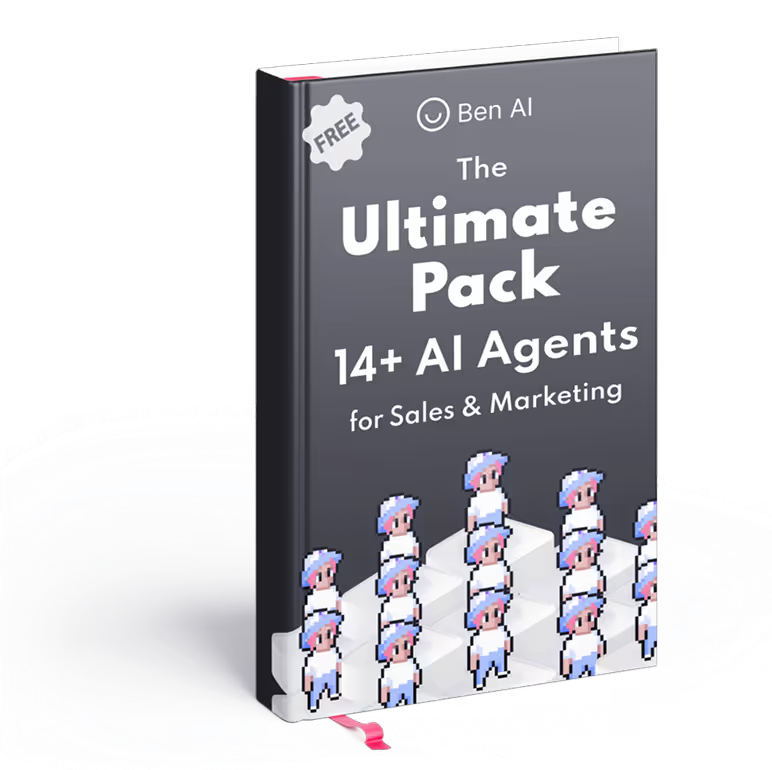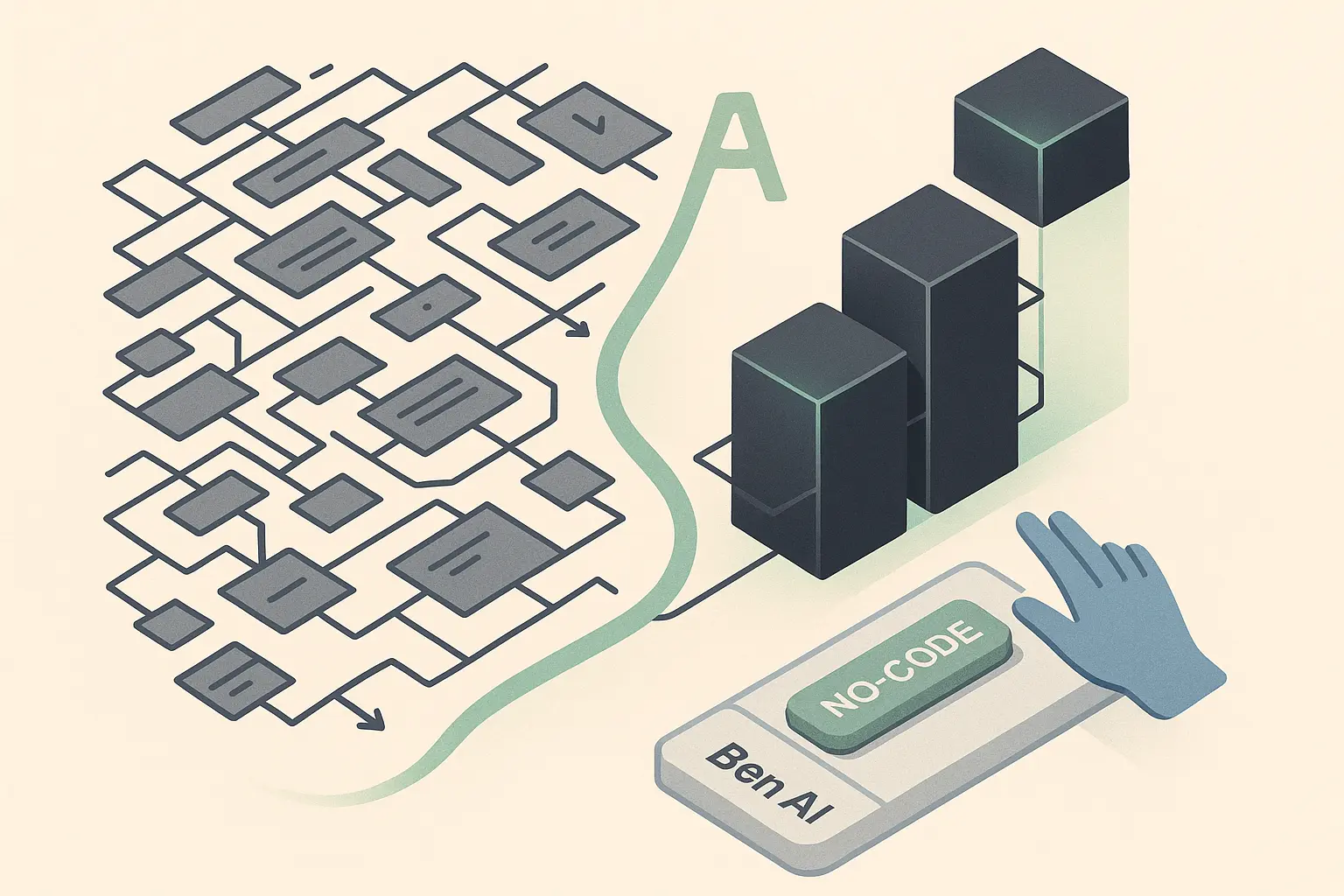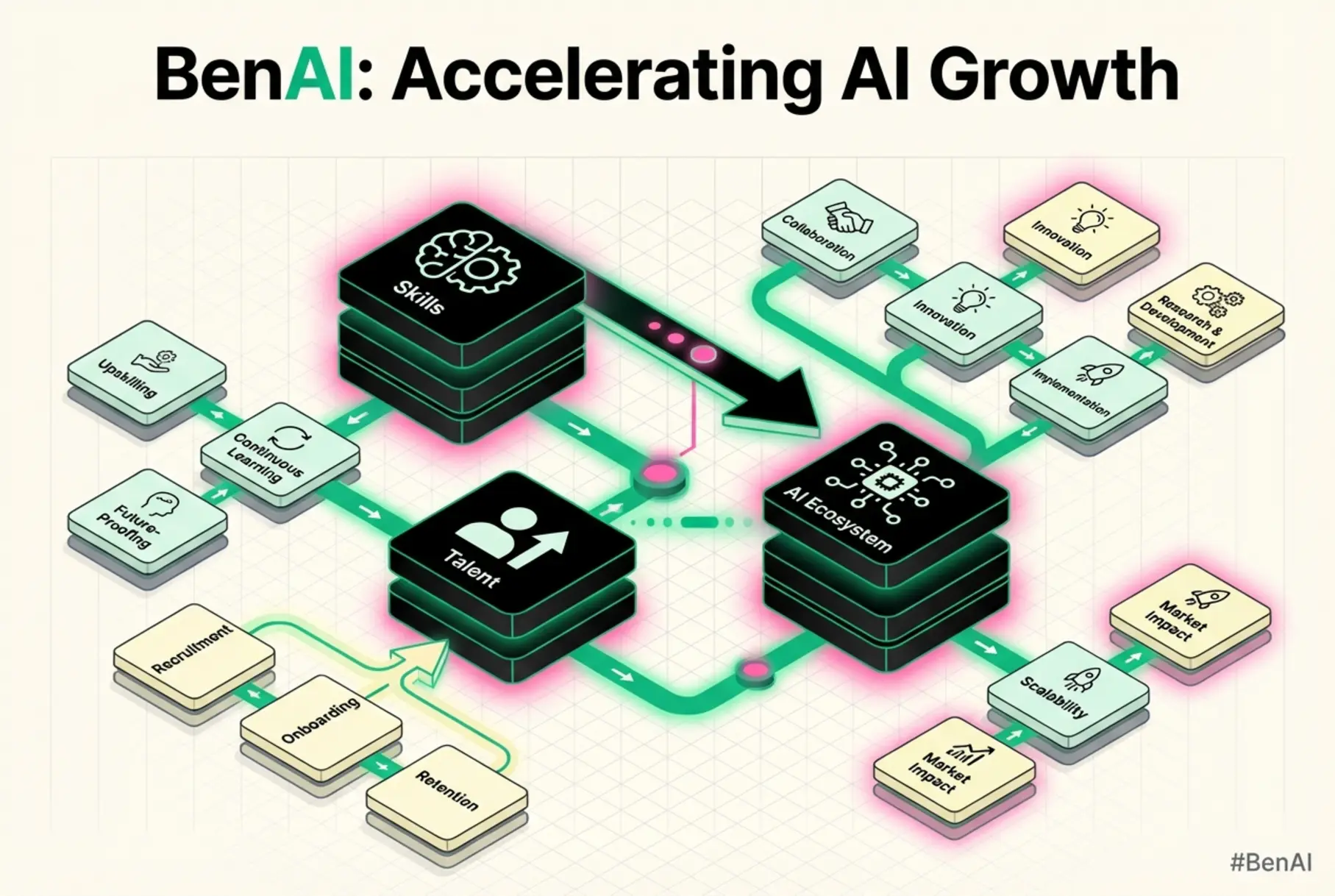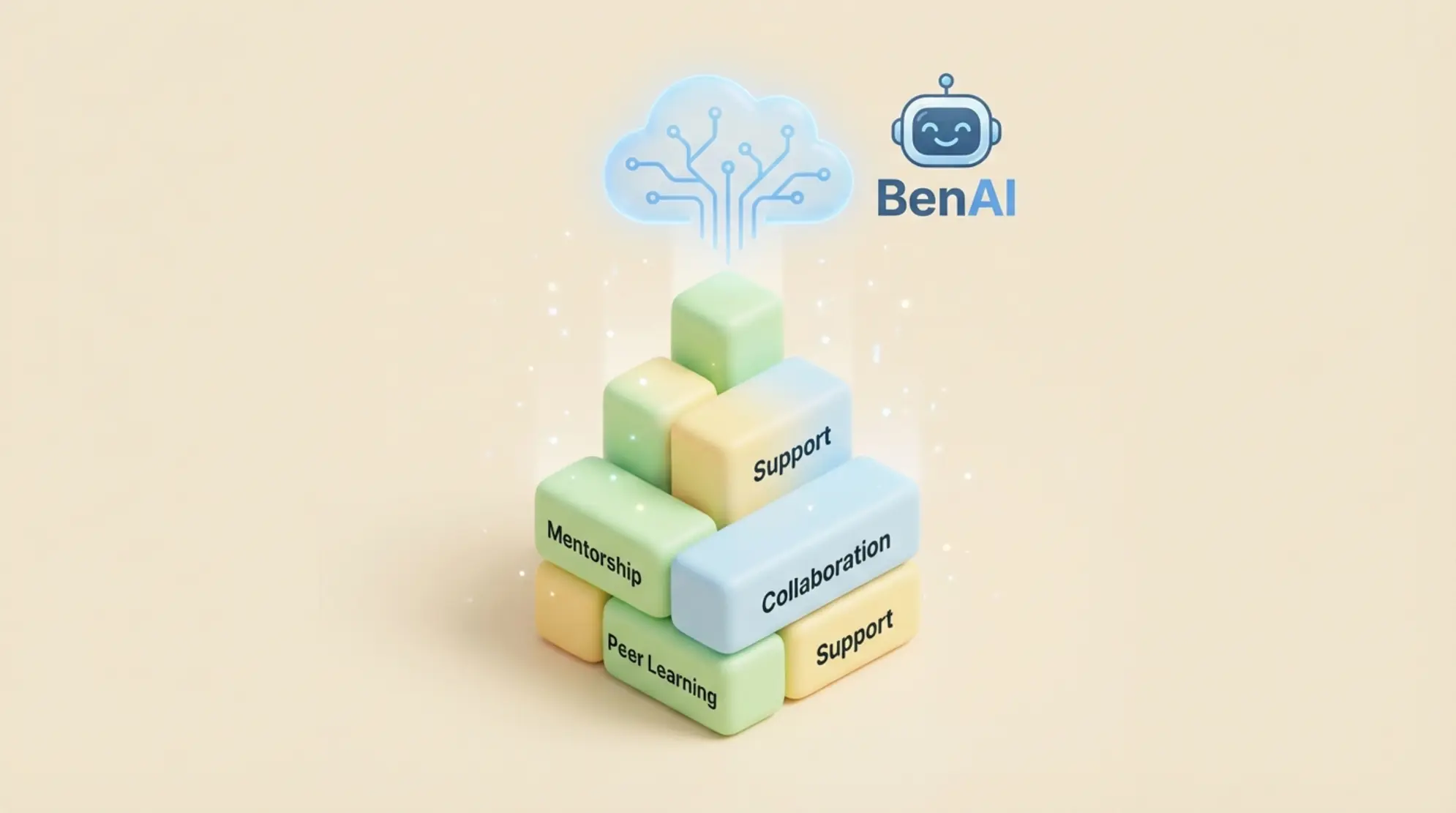The escalating complexity of maintaining a healthy online presence, coupled with the intricate demands of search engine algorithms, has traditionally relegated deep technical SEO to a niche of highly skilled developers. This creates significant pain points for marketers and small business owners: audits become time-consuming, repetitive tasks introduce human error, and scaling organic presence across large, dynamic sites is nearly impossible without substantial dedicated resources.
No-code AI automation emerges as the definitive answer to these challenges. This innovative approach leverages artificial intelligence systems to perform critical technical SEO tasks, such as site speed analysis, mobile-friendliness checks, crawl error detection, XML sitemap generation, and structured data validation without requiring any coding expertise. By democratizing access to crucial site health management, no-code AI empowers non-developers to achieve efficiency, accuracy, and scalability in their SEO efforts. This guide offers a practical, step-by-step blueprint for implementing AI-driven technical SEO without needing to write a single line of code, transforming how businesses manage and optimize their digital foundations
How Does No-Code AI Democratize Technical SEO for Enhanced Efficiency?
The integration of no-code artificial intelligence tools into technical SEO workflows fundamentally redefines efficiency, transforming traditionally time-intensive and error-prone tasks into streamlined, automated processes accessible to anyone. These advanced AI tools address common technical SEO frustrations by providing:
- Time Savings & Efficiency: AI automates approximately 80% of repetitive SEO tasks, reducing manual data analysis time by over 70%, liberating valuable resources for strategic initiatives. This allows SEO professionals to focus on higher-value activities such as content strategy, competitive analysis, or link building, rather than tedious auditing processes (SeoProfy, Gitnux, ZipDo).
- Unrivaled Accuracy: AI-powered site audits identify up to 35% more issues than manual reviews, ensuring comprehensive detection and remediation of critical site health problems (Gitnux, ZipDo). AI's capacity for processing vast datasets minimizes human oversight and consistently applies best practices across an entire website, from small blogs to large e-commerce platforms.
- Scalability for Growth: AI automation manages large, complex sites and multi-regional SEO without proportional increases in effort or staffing. This capability is crucial for businesses experiencing rapid growth or those operating across diverse geographical markets, allowing them to expand their digital footprint efficiently.
- Proactive Optimization: AI moves from reactive fixes to predictive insights, anticipating algorithm changes and potential issues. This allows for the implementation of preventative measures, such as adjusting content strategies for emerging AI Overviews (AEO) or optimizing technical elements for future Core Web Vitals updates, keeping your site ahead of the curve.
- Empowering Non-Developers: According to RoboticMarketer, no-code AI SEO audit tools are empowering non-developers to conduct technical audits, effectively democratizing access to crucial site health management. This enables marketers, content creators, and small business owners, who often lack deep coding skills, to take direct control of their site's technical foundation, understanding the full impact of their AI SEO solutions through accessible platforms (RoboticMarketer, BenAI).
These benefits collectively illustrate why no-code AI technical SEO automation is essential for scaling organic presence, ensuring that businesses can navigate the complexities of modern search engines with unprecedented speed and precision.
The No-Code AI Toolkit: Step-by-Step Automation for Key Technical SEO Tasks
This section provides an actionable blueprint for marketers and site owners to harness the power of no-code artificial intelligence, transforming complex technical SEO challenges into straightforward, automated solutions for enhanced site performance and visibility. Leveraging an AI agent for agencies can streamline diverse tasks, ensuring comprehensive coverage and rapid implementation across multiple client sites (BenAI).
How Can No-Code AI Streamline Site Speed Analysis and Optimization?
Slow site speed remains a critical barrier to user engagement and search engine rankings, but with no-code artificial intelligence, automating comprehensive analysis and implementing effective optimizations is now within every marketer's reach. Websites with slow load times suffer from higher bounce rates, poor user experience, and reduced visibility in search results, directly impacting Core Web Vitals performance.
AI Solution: AI platforms automate performance monitoring, identifying bottlenecks such as large images, unoptimized code, or render-blocking resources. They generate precise optimization suggestions, including image compression, lazy loading recommendations, and critical CSS prioritization, tailored to specific page elements and user behavior.
No-Code Steps for Site Speed Optimization:
- Integrate an AI-powered performance plugin/tool: Install a no-code AI performance plugin (e.g., specific CMS performance plugins with AI features, a service like Lighthouse AI, or platform-integrated tools) directly into your content management system (CMS) or connect it via an intuitive dashboard. These tools often feature prompt engineering agents to guide users through optimization queries (BenAI).
- Run an automated site audit: Initiate a full site speed audit through the AI tool. This process automatically scans your pages, mimicking real user experiences across different devices and network conditions.
- Interpret AI-generated insights: Review the detailed report provided by the AI. This report translates complex performance data into actionable, easy-to-understand recommendations, highlighting specific issues (e.g., "Reduce server response times," "Eliminate render-blocking resources").
- Implement no-code fixes: Apply the suggested optimizations directly within the tool or via your CMS settings. Examples include one-click image compression, automatic lazy loading for offscreen images, enabling browser caching, or configuring a Content Delivery Network (CDN) through simple toggles and input fields.
- Monitor continuous improvements: Utilize the AI tool's continuous monitoring feature to track Core Web Vitals and overall site speed metrics. The AI continuously identifies new opportunities for optimization and alerts you to any performance regressions, ensuring your site remains fast and responsive.
Is Mobile-Friendliness Automation with AI a No-Code Reality?
Absolutely, ensuring a seamless mobile experience is no longer a complex development task; no-code artificial intelligence solutions have transformed mobile-friendliness checks and adaptive fixes into an accessible reality for all. Inconsistent mobile experiences directly harm user engagement and significantly impact search rankings, especially with Google's mobile-first indexing paradigm.
AI Solution: AI provides automated mobile usability audits, identifying issues like unclickable elements, content wider than the screen, small font sizes, and poor viewport configuration. It recommends responsive design adjustments and suggests dynamic content alterations to ensure optimal display and functionality across all device types.
No-Code Steps for Mobile-Friendliness Automation:
- Deploy an AI-powered mobile audit tool: Select a no-code AI tool or platform feature (e.g., within an AI-powered page builder, specialized mobile SEO plugins, or an AI agents creation platform that builds custom auditors) that specifically offers mobile-friendliness scanning (BenAI).
- Conduct a comprehensive mobile usability scan: Run an automated audit that simulates various mobile device views and screen resolutions. The AI meticulously checks for common mobile usability pitfalls.
- Review the AI's diagnostic report: Examine the generated report, which clearly flags mobile-specific errors, detailing why each issue affects user experience and mobile-first indexing.
- Implement responsive design recommendations: Use the tool's no-code interface to apply recommended fixes. This might involve adjusting layout settings in a page builder, automatically scaling images, or configuring breakpoints with simple drag-and-drop actions.
- Optimize dynamic content for mobile: Leverage AI to suggest and implement dynamic content variations or adaptive asset loading specifically for mobile users, ensuring fast and relevant content delivery without manual coding.
- Verify mobile-friendliness: Re-run the audit and utilize tools like Google's Mobile-Friendly Test to confirm that all identified issues have been resolved and your site delivers an excellent mobile experience.
What No-Code AI Strategies Detect and Remediate Crawl Errors Effectively?
Crawl errors silently erode a site's SEO performance, but no-code artificial intelligence systems offer an intelligent approach to not only detect these issues in real-time but also provide actionable, prioritized remediation strategies accessible to non-technical users. Problems like broken links (404s), extensive redirect chains, or server errors waste valuable crawl budget and prevent important pages from being indexed, directly impacting visibility.
AI Solution: AI offers real-time crawl monitoring, utilizing anomaly detection to spot unusual patterns in crawl behavior or error spikes. It prioritizes error reporting based on potential impact on user experience and SEO, providing automated fix suggestions for common issues like outdated redirects, broken internal links, or incorrect canonical tags.
No-Code Strategies for Crawl Error Detection and Remediation:
1. Integrate an AI crawler or platform: Connect an AI-powered crawler (e.g., integrated features within comprehensive SEO platforms, specialized AI tools, or advanced versions of standard crawlers with AI add-ons) to your website. Many platforms like BenAI offer relevance AI flow builder tools to customize these checks.
2. Schedule automated crawl audits: Configure the AI crawler to run regular, automated audits of your site. The AI continuously monitors for new or recurring crawl errors, ensuring issues are caught promptly.
3. Analyze AI-prioritized error reports: Review reports that categorize crawl errors by severity and potential impact. The AI identifies critical errors (e.g., broken payment pages) versus less impactful ones, allowing for focused remediation.
4. Implement no-code fixes for common errors: Utilize the tool's interface to apply automated or guided fixes. This might include:
- Bulk redirect tools: Automatically creating 301 redirects for broken pages to relevant new content.
- Internal link repair suggestions: Identifying and updating internal links pointing to 404 pages.
- Content update alerts: Notifying you when pages return server errors, prompting content review or restoration.
5. Monitor crawl budget optimization: Leverage AI insights to ensure your crawl budget is efficiently allocated, preventing Googlebot from wasting time on irrelevant or broken pages. The AI can suggest adjustments to robots.txt or internal linking strategies.
How Can AI Automate XML Sitemap Generation and Validation with No-Code?
Manual XML sitemap management is prone to errors and often struggles to keep pace with dynamic site changes, yet no-code artificial intelligence tools revolutionize this process, ensuring your sitemaps are always current, validated, and optimized for search engine indexing. Outdated sitemaps can lead to indexing issues, delayed discovery of new content, and inefficient crawl patterns by search engines.
AI Solution: AI plays a crucial role in automated sitemap generation by dynamically detecting new or updated pages and automatically adding them to the sitemap. It performs real-time validation against Google's guidelines, ensuring correct XML formatting, proper lastmod dates, and appropriate <loc> tags. Furthermore, AI facilitates dynamic updates based on content changes, new product listings, or blog posts, ensuring immediate reflection in the sitemap.
No-Code Steps for XML Sitemap Automation:
- Activate an AI sitemap plugin/feature: Install and activate an AI-powered SEO plugin (e.g., Rank Math, Yoast SEO Premium, or specific CMS AI tools) that includes automated XML sitemap generation. These tools are often part of broader AI SEO solutions platforms (BenAI).
- Configure basic sitemap settings: Within the plugin's dashboard, define core parameters such as content types to include (posts, pages, products), exclusion rules (e.g., certain tags or categories), and update frequencies, all through intuitive toggle switches and dropdown menus.
- Enable dynamic sitemap generation: The AI automatically detects new content or updates to existing pages, adding them to the sitemap and updating the
lastmodtag without manual intervention. This ensures search engines always have the most current information. - Automate sitemap validation: The AI continuously validates the sitemap against Google's technical requirements, flagging any structural errors or invalid URLs. This proactive validation prevents issues that could hinder indexing.
- Automate sitemap submission: Configure the plugin to automatically ping search engines (e.g., Google Search Console) whenever the sitemap is updated, notifying them of changes and prompting re-crawling.
- Review sitemap health in search console: Regularly check Google Search Console's "Sitemaps" report to confirm successful processing and identify any potential issues reported by Google, which the AI can then help diagnose.
What No-Code AI Approaches Enhance Structured Data Validation and Implementation?
Structured data is fundamental for communicating context to search engines, but its complexity often deters implementation; however, no-code artificial intelligence systems now empower marketers to easily generate and validate accurate schema markup, unlocking significant rich snippet opportunities. Complex schema markup, common errors in implementation, and missed opportunities for rich snippets directly limit a site's visibility in search results.
AI Solution: AI leverages Natural Language Processing (NLP) to analyze page content and automatically generate accurate, contextually relevant schema markup for various entities (e.g., products, FAQs, articles, reviews, local businesses). It provides real-time validation against schema.org guidelines and offers contextual markup suggestions based on detected content types, significantly boosting rich snippet potential. Statistical Evidence indicates that AI-powered schema markup generation increases rich snippet appearance by 40%, significantly enhancing SERP visibility (Gitnux).
No-Code Steps for Structured Data Automation:
- Integrate an AI-powered schema generator: Implement a no-code AI tool (e.g., Schema App, Rank Math, Yoast SEO Premium, or dedicated AI content optimizers with schema features) that automatically generates and validates structured data.
- Select content type and input data: Choose the specific schema type (e.g, Product, Article, FAQPage) and either let the AI automatically extract information from your page or input relevant details through a user-friendly form.
- Review AI-generated schema: The AI system will present the generated schema markup. Review it for accuracy, ensuring it reflects your content precisely and adheres to best practices for entity-based SEO for AI Overviews.
- Validate schema in real-time: Utilize the tool's built-in validation feature, which instantly checks the generated schema against Google's Structured Data Testing Tool and Schema.org standards, highlighting any errors or warnings.
- Implement or embed the schema: With a single click, publish the validated schema to your page. Many no-code AI tools automatically inject the JSON-LD into the appropriate section of your site's HTML, removing the need for manual coding.
- Monitor rich snippet performance: Track your rich snippet appearance and performance in Google Search Console's Rich Results Status Reports, observing the direct impact of AI-enhanced structured data on your SERP visibility.
<!-- VISUAL STORYTELLING: Easily compare leading no-code AI tools to select the best option for your technical SEO automation needs -->
Beyond Basics: Strategic AI Integration for E-E-A-T & Future-Proofing
While no-code artificial intelligence excels at automating immediate technical fixes, its true strategic value lies in building enduring E-E-A-T and future-proofing your site for the evolving landscape of AI-first search. This proactive approach ensures your digital assets remain resilient against algorithm changes and competitive in an increasingly AI-driven online environment.
How Does Technical AI Automation Contribute to E-E-A-T and Future-Proof for AI Overviews?
Technical artificial intelligence automation forms a crucial, often unseen, foundation for E-E-A-T by ensuring impeccable site health, optimal performance, and perfectly structured data, thereby signaling credibility and authority directly to both traditional search algorithms and emerging AI Overviews (AEO) and Generative Search (GEO) environments. A fast, error-free site with robust structured data demonstrates Experience, Expertise, Authoritativeness, and Trustworthiness. For instance, perfectly implemented schema markup, facilitated by AI, provides explicit signals about the entity's nature, helping AI parse and understand content with greater accuracy. This precision in technical implementation directly influences how sites are perceived by Google's evolving algorithms, including those powering AI Overviews, where factual accuracy and reliable indexing are paramount. Human oversight remains critical to guide these automated processes and maintain strategic alignment.
Choosing Your No-Code AI Technical SEO Arsenal: A Comparative Guide
Selecting the right no-code artificial intelligence tools is pivotal for successful technical SEO automation, requiring a clear understanding of your unique needs and a structured evaluation of available solutions. An effective AI SEO automation blueprint demands thoughtful consideration of each tool's capabilities.
When evaluating your no-code AI technical SEO arsenal, consider these key criteria:
- Ease of Use: Prioritize platforms with intuitive interfaces and minimal learning curves.
- Specific Technical Task Focus: Determine if a tool specializes in a particular area (e.g., site speed) or offers a broader suite of technical optimizations.
- Integration Capabilities: Assess how well the tool integrates with your existing CMS, analytics platforms, and other marketing tools.
- Pricing Structure: Compare free tiers, subscription models, and enterprise options to find a solution that aligns with your budget.
- Support & Community: Look for robust customer support, documentation, and an active user community for troubleshooting and best practices.
How BenAI Empowers Your Technical SEO Automation Journey
BenAI stands at the forefront of the no-code revolution, offering a powerful, integrated platform specifically engineered to demystify and automate even the most complex technical SEO tasks, thereby empowering marketers to achieve unparalleled organic growth and efficiency. Our comprehensive suite of AI SEO solutions provides an end-to-end blueprint for managing your site's technical health. BenAI seamlessly automates critical functions such as real-time site speed analysis, comprehensive mobile-friendliness checks, proactive crawl error detection and remediation, dynamic XML sitemap generation and validation, and accurate structured data implementation. By transforming these traditionally technical challenges into intuitive, no-code workflows, BenAI ensures that businesses of all sizes can achieve measurable ROI through enhanced site performance, improved search rankings, and a future-proof digital foundation.
FAQs
Will AI Technical SEO Automation Replace Human SEO Professionals?
No, AI technical SEO automation is not designed to replace human SEO professionals, but rather to augment and empower their capabilities, shifting their focus from repetitive tasks to strategic oversight and creative problem-solving. AI excels at data analysis, pattern recognition, and executing routine tasks with speed and accuracy, freeing up human SEOs to concentrate on complex strategy development, nuanced content creation, ethical considerations, and adapting to unforeseen market shifts. Human expertise remains indispensable for interpreting complex data, understanding user intent beyond algorithms, and forging creative solutions. For instance, how we automated an SEO agency with 15 agents demonstrates that AI acts as a force multiplier, not a replacement (BenAI).
Are AI-Generated Technical Fixes Safe from Google Penalties?
When implemented thoughtfully and aligned with Google's guidelines, AI-generated technical fixes are generally safe; however, the key lies in prioritizing helpfulness and quality, with essential human review serving as the ultimate safeguard. AI assists in identifying issues and suggesting solutions based on established best practices. If these suggestions lead to improvements in user experience, site performance, and content quality, they align with Google's "helpful content" and quality standards. Conversely, any attempt to manipulate rankings through AI-generated spam or deceptive practices will incur penalties. Consequently, always conduct a human review of AI recommendations, ensuring they uphold ethical SEO practices and adhere to Google's webmaster guidelines.
What is the Best Free No-Code AI Tool for Technical SEO Automation?
Identifying a single 'best' free no-code artificial intelligence tool for all technical SEO automation tasks is challenging, as capabilities often vary; however, several excellent options provide robust entry-level automation for specific needs. For instance, Google PageSpeed Insights provides critical site speed diagnostics, which can be complemented by free versions of AI-powered analysis tools that offer interpretation and basic recommendations. For structured data, numerous free schema generators use AI to help craft basic markup. While free tools offer significant value for entry-level automation, they often come with limitations on scale, advanced features, or integrations, making them suitable for initial explorations rather than comprehensive, enterprise-level solutions. For building more complex automation, understanding mastering prompt engineering for AI agents and automation systems is key, even with free tools (BenAI).
Join Our Growing AI Business Community
Get access to our AI Automations templates, 1:1 Tech support, 1:1 Solution Engineers, Step-by-step breakdowns and a community of forward-thinking business owners.

Latest Blogs
Explore our latest blog posts and insights.




